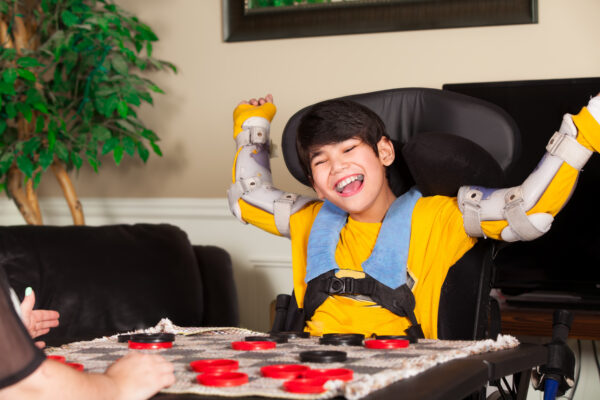This session is available as part of these two comprehensive series. Register for
Therapies in the School 23rd Annual Conference 2022 DAY TWO ON DEMAND 9
OR
Therapies in the School 23rd Annual Conference 2022 – ON DEMAND 9
COURSE DESCRIPTION:
Children with medical complexity (CMC) often demonstrate impairments across cognitive, sensory, and motor domains. It is often difficult for therapist to identify subtle abilities and skills of CMC that may enhance their quality of life and participation in home, school and community environments. This course will focus on the school environment and discuss the ICF framework, the “F-word on Childhood Disability”, quality of life and humanism conceptual models to improve participation and physical activity levels specific to CMC across the school day.
LEARNING OBJECTIVES:
- Identify applications of the International Classification of Functioning, Disability and Heath (ICF) framework in pediatric physical therapy
- Utilize quality of life and humanistic conceptual models and “F-words on Childhood Disability”5 in serving CMC
- Choose possible assessment and outcome measures including GAS for children with multiple disabilities across the ICF framework
- Select school-based strategies to improve participation and physical activity levels for CMC
AUDIENCE:
School based therapists.
COURSE OUTLINE:
- ICF, Quality of Life, F-words on Childhood Disability
- Outcomes and goal attainment scaling
- Enhancing Participation and Physical Activity Levels across the School Day
- Case study with participant discussion
Cynthia Dodds PT, PhD, PCS is an Associate Professor within the Division of Physical Therapy, College of Health Professions at the Medical University of South Carolina. She is responsible for the pediatric content within the program, which includes pediatric experiential learning opportunities in South Carolina and Africa for physical therapy students. Cindy is also Director of the MUSC Physical Therapy Pediatric Residency. Her clinical and research interest focuses on children with medical complexity, including examination of heart rate variability and development of the Pediatric Awareness and Sensory Motor Assessment. She is a co-principal investigator for the MUSC site of the I-Acquire study and was recently awarded research funding from the National Endowment of the Arts.
Once you purchase an online course you will have access to the course materials. If you have purchased this course, please ensure you have logged in to your account in order to take the exam.
Once you purhcase an online course, you will have the opportunity to take an exam to test your retention of the material. If you have purchased this course, please ensure you have logged in to your account in order to take the exam. The exam must be completed with a pass rate of 80% or more in order to receive your certificate of attendance.
Continuing Education Hours for disciplines not listed below: 2.5 contact hours (0.25 CEUs). Intermediate level. License #______________.
Education Resources Inc. is an AOTA Approved Provider of professional development. Course approval ID#05439. This Distance Learning-Independent course is offered at 2.5 contact hours 0.25 CEUs, Intermediate Level, OT Service Delivery & Foundational Knowledge. AOTA does not endorse specific course content, products or clinical procedures. This course can be used toward your NBCOT renewal requirements for 2.5 units. This course meets the approval of the TX Board of OT Examiners.
Approved for FL Occupational Therapists for 3 continuing education hours, #20-1007224. This session applies 2.5 contact hours (0.25 CEUs) toward approval but this must combine with another session of this series to receive CEUs and approval number by KY Physical Therapy Association. Course meets the basic criteria of the MD Board of Physical Therapy Examiners for 0.25 CEU's, 2.5 Contact Hours. Approval #2304-02 by the NJ State Board of Physical Therapy Examiners for 2.5 CEC's. Approved sponsor by the State of IL Department of Financial and Professional Regulation for Physical Therapy for 3 contact hours. Approved provider by the NY State Board of Physical Therapy for 3 contact hours (0.3 CEUs). Education Resources is an approved agency by the PT Board of CA for 2.5 contact hours. This activity is provided by the TX Board of PT Examiners accredited provider #1910017TX for 2.5 CCUs and meets continuing competence requirements for PTs and PTAs licensure renewal in TX. Approved Provider for OK State Board of Medical Licensure & Supervision #BAP202310003.
Most Physical Therapy State Boards accept webinars as a live offering. Please check with your state board to confirm. The following state boards of physical therapy accept other states’ approval: AK, AR, AZ, DC, DE, GA, HI, ID, IN, KS, MA, MI, MO, MS, NC, OR, PA, RI, SC, UT, VA, VT, WI, WY. The following state boards of physical therapy either do not require course pre-approval or do not require CEUs for re-licensure: AL, CO, CT, IA, ME, MT, NE, ND, NH, SD, WA. 2.5 hours of this course qualify towards the discipline-specific hours for the 20-hour requirement for NDTA re-certification. They do NOT qualify towards the 8-hour NDTA Instructor requirement for re-certification.
Education Resources Inc. 266 Main St, Medfield, MA 02052 • 800-487-6530


